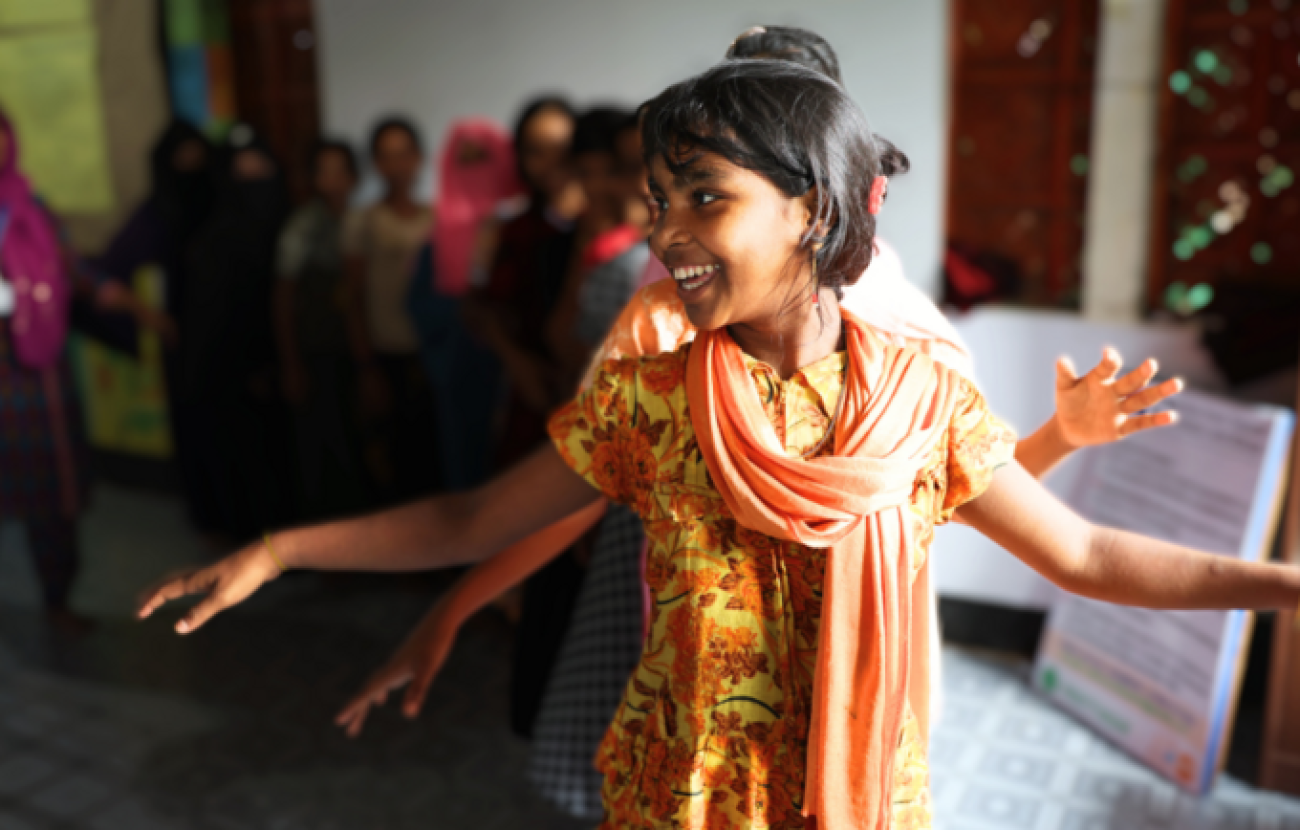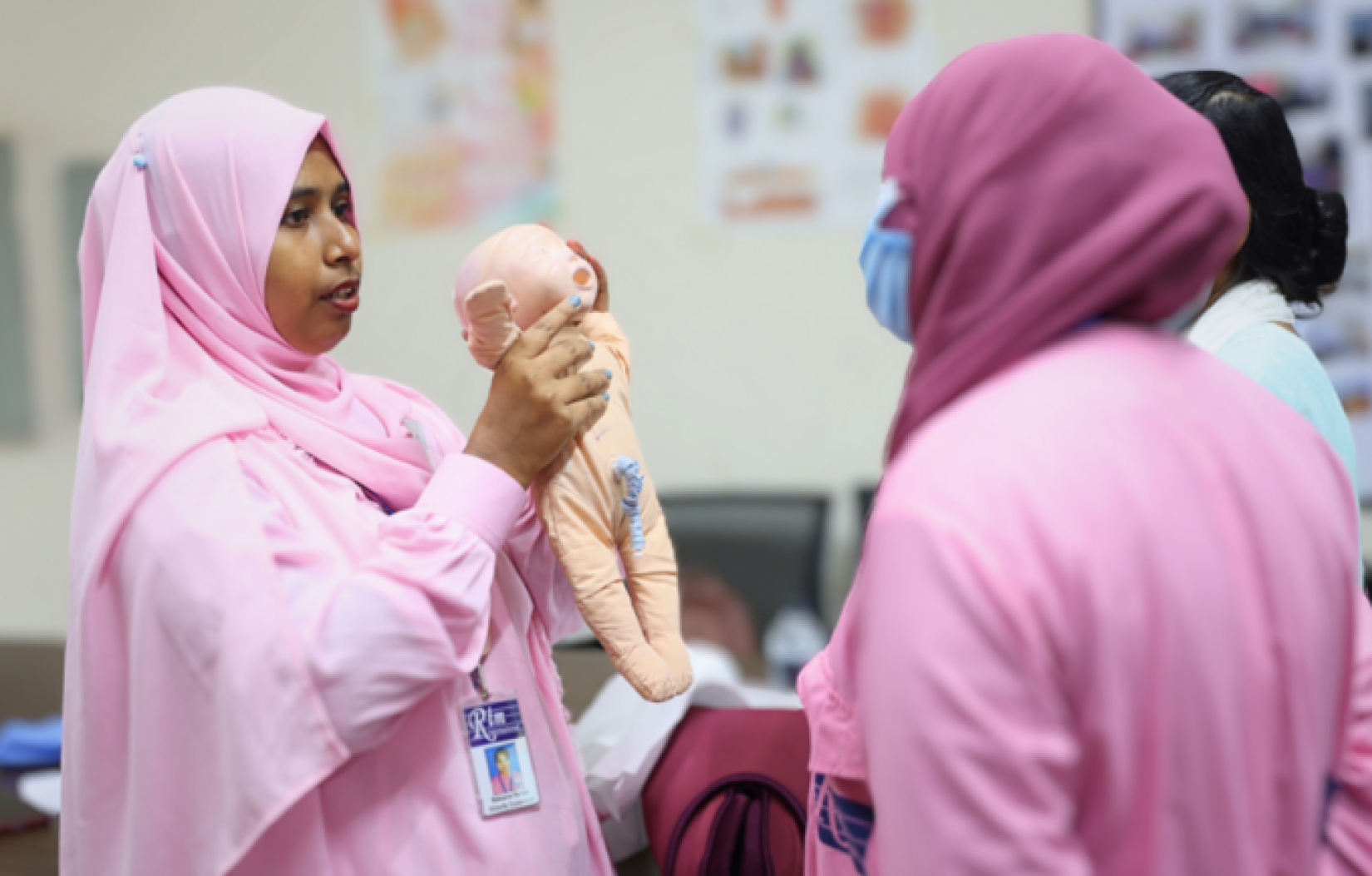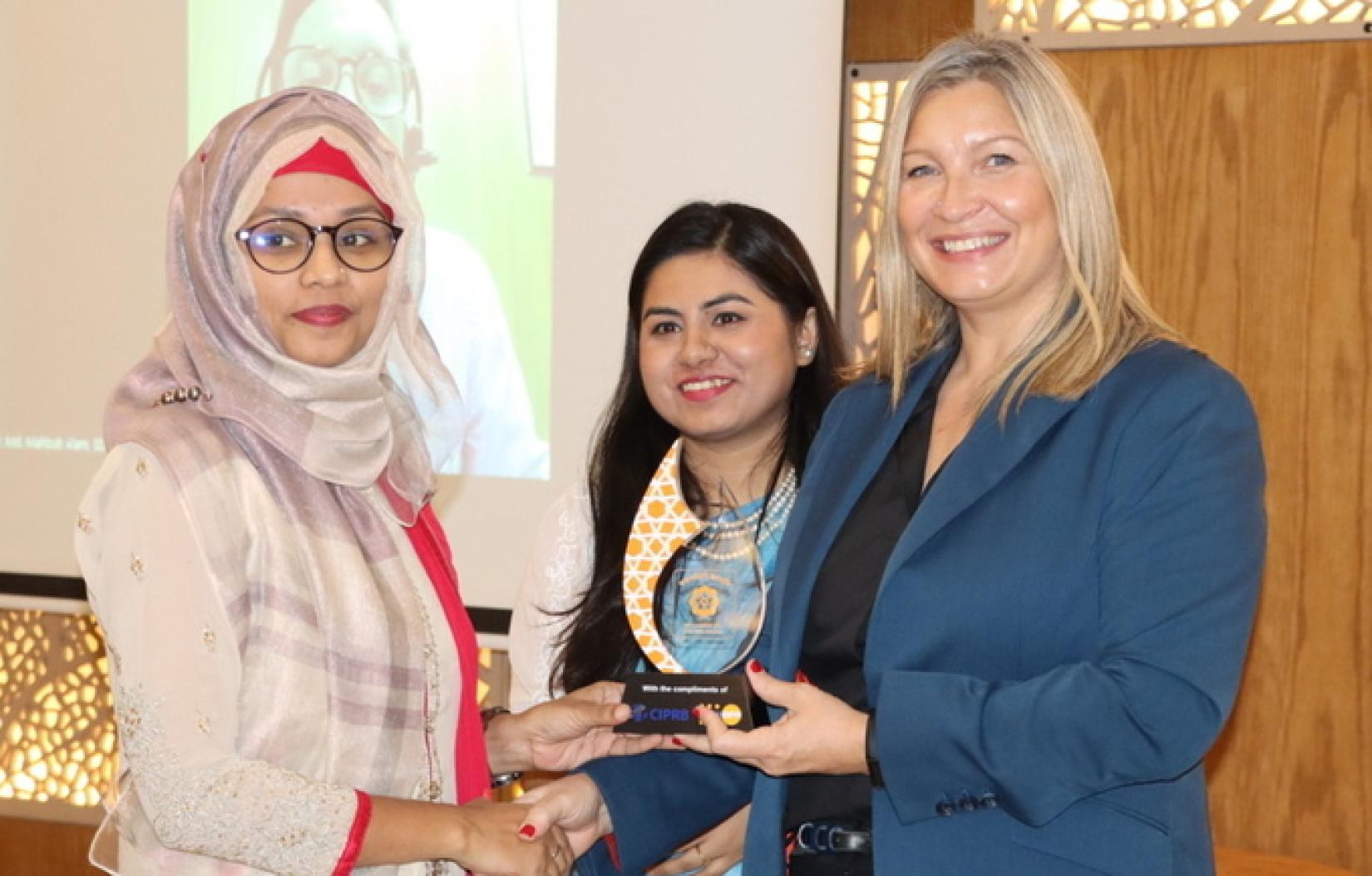Updates from UNFPA Bangladesh

1 January 2023
Fostering Positive Development through UNFPA's Youth Centers in Rohingya Refugee Camps
31 December 2023
During 2022 and 2023 UNFPA Cox Bazar embarked on a transformative journey, focusing on the well-being and development of adolescents and youth within Rohingya refugee camps. This journey centered around the establishment of eight purpose-built Adolescent and Youth Centers, aiming to catalyze positive change within the community. The Adolescent and Youth program has reached over 16,215 individuals since 2022 on over, encompassing adolescent boys, girls, their caregivers, and stakeholders.
This success story owes much to the generous support from the Korea International Cooperation Agency (KOICA). Their commitment has empowered UNFPA to implement sustainable solutions that extend beyond immediate relief, fostering enduring change in the lives of adolescents and youth in Cox's Bazar.
Empowering Young People through Tailored Programs: These youth centers have a clear goal: unleashing the potential of Rohingya adolescents and youth living in the camps. They focus on knowledge transfer about Sexual and Reproductive Health and Rights (SRHR), Gender-Based Violence (GBV), and Menstrual Health Management, so young people can thrive and make informed decisions.
Girl Shine: Supporting Girls' Growth: One special program run in these centers is "Girl Shine." It's a well-thought-out training program designed to empower and protect adolescent girls. By teaching them, and their caregivers about sexual health and reproductive rights, this program helps young girls both from Rohingya and Host communities feel stronger and more confident.
Champions of Change: Shaping Positive Social Norms: Another program, "Champions of Change," is for boys and young men, including caregivers. This program aims to instill positive social norms, teaching them to have good habits and respect for girls and women, fostering a culture of equality and understanding.
Beyond Classroom: A Whole Experience and Holistic Engagement: The success of these centers relies on a holistic approach, extending beyond life skills Community engagement, sports for development, theater for development, and mental health and psychosocial support counseling from the comprehensive program.
Youth-Driven Spaces: A Voice for Change: These spaces were initiated from the expressed needs of the Rohingya youth themselves. They desired a place that belonged to them, where they could feel heard, safe, and learn. The adolescents found safe spaces to grow—an intentional effort to involve them in decision-making. A 13-year-old adolescent girl, Jahura, from the Rohingya Camp in Cox’s Bazar, stated, "Youth Center is the place where I find my dream and happiness.
Talking About Menstruation: Breaking Taboos: Within the facilities, a special emphasis is placed on breaking menstrual health taboos and they openly discuss menstruation and hygiene management. The young girls receive menstrual Health Management kits, are informed about health management, and are taught to make reusable pads to help them manage their periods better.
In essence, UNFPA's Youth Centers in Rohingya refugee camps go beyond being physical structures. They are catalysts for change, empowering adolescents and young people to become agents of positive transformation in their community.
Through education, support, and engagement, these centers lay the foundation for a brighter and more equitable future for all.
Saving Lives and Building Trust: Roksana's Path as a Midwife Supervisor
20 December 2023

In the heart of a bustling refugee camp in Cox’s Bazar, Bangladesh, where every day presents new challenges and opportunities, there exists a beacon of hope, a hero in the world of maternal and child healthcare. Meet Roksana, a supervisor of midwives, whose remarkable journey is not only inspiring but also an example of the transformative power of training and dedication. As we look further into her story, we discover the profound impact of the United Nations Population Fund’s (UNFPA) training programs and how they've equipped many midwives like Roksana to save lives and uplift communities.
Roksana's journey to becoming a supervisor of midwives began as a dedicated midwife in the Rohingya refugee camp without a midwife supervisor. Her path was illuminated by the remarkable story of an international midwife mentor who visited her facility to provide midwifery mentorship to her other coworkers. This encounter inspired Roksana to pursue a career as a supervisor, recognizing it as an opportunity to showcase her leadership qualities. She worked hard to pass the supervisor exam, driven by her love of teaching and a desire to make a lasting impact.
UNFPA's Training: Turning Theory into Practice : Before the advent of UNFPA's training programs, midwifery knowledge was primarily theoretical for Roksana. However, the introduction of Midwifery Life Saving Training was a game-changer. It allowed midwives to engage in simulation exercises, transforming theoretical knowledge into practical skills. This newfound capability to handle life-threatening conditions such as severe bleeding raised blood pressure in pregnancy, infections, and newborn resuscitation has been incredibly helpful. Roksana has also grown as a mentor herself, facilitating these training sessions to share her knowledge and skills with fellow midwives.
Building Trust, Transforming Communities: Roksana's role extends far beyond clinical care; it's about building trust and delivering respectful maternity care. Her compassionate approach has created a positive environment in the community she serves. Mothers seek her out when they are ready to give birth, trusting her expertise and care. Community health workers refer to her as "Boro Apa (Elder Sister)," a term of respect and endearment, a testament to the trust she has earned.
Being a supervisor of midwives comes with its own set of challenges. Roksana faces issues such as the lack of simulation dummies or models, making some mentoring situations challenging. UNFPA, as the Sexual and Reproductive Health Working Group (SRHWG) lead, has liaised with the World Health Organization (WHO) and is delivering the essential Midwifery Lifesaving Skills training at a government-run facility located within Cox's Bazar Medical College. This training utilizes state-of-the-art laboratory equipment, creating an optimal environment for midwives to engage in real-time simulation exercises.
Additionally, there is a shortage of midwives, leading to a rush of patients in her facility, limiting the time available for proper mentorship. Despite these hurdles, Roksana's commitment shines through as she seeks creative solutions to continue delivering quality care.
While exact maternal mortality data is unavailable in the refugee camp, the impact of UNFPA's training programs is evident. Facility-based deliveries have risen significantly, from 22% in 2018 (BRAC’s Humanitarian Response in Cox’s Bazar Strategy for 2018) to a remarkable 82% (Health Sector Bulletin - Aug 2023) in 2023. This increase reflects the growing skills of midwives through training and mentorship, ultimately saving lives and improving health outcomes.
According to the International Midwifery Mentors at UNFPA Bangladesh, Ms. Ana Velez, and Ms. Christine Eloto, by the end of September 2023, UNFPA has implemented 11 sessions for UNFPA implementing partners and 3 sessions for the Sexual and Reproductive Health Working Group partners. Additionally, 2 sessions in Bhasan Char were also conducted. They have reached over 285 midwives in the Cox's Bazar and Bhasan Char areas. There has been a significant improvement in self-perception of confidence to respond to obstetric and newborn emergencies. On average, before the training, 49% of participants felt extremely confident in responding to emergencies, versus 74% after the training.
A Heroic Moment: Saving a Mother's Life : Among the many stories that stand out, one particular incident shines brightly. A pregnant woman arrived at Roksana's facility unconscious and bleeding profusely. Her vital signs were alarming, and it was diagnosed as a shock due to an incomplete abortion. With quick thinking and skilled hands, Roksana and her team initiated the Non-pneumatic Anti-shock Garment (NASG), administered oxygen, established an IV access to stabilize the woman, and arranged an immediate referral to a field hospital. The mother required three units of blood, and for three days, the NASG remained a lifeline. Through their expertise, Roksana and her team saved a mother's life, a testament to the life-saving impact of their training.
A Vision for the Future: As Roksana looks ahead, her goals are clear: to continue developing the skills of midwives through mentorship, providing respectful maternity care to her community, and enhancing her mentoring abilities through ongoing knowledge updates. Her vision is rooted in the belief that every mother should experience a safe and joyous childbirth, and she remains steadfast in her mission to make this vision a reality.
In Roksana, we find not just a midwife supervisor but a hero who embodies the spirit of compassion, dedication, and lifelong learning. UNFPA's training programs have not only equipped midwives with skills but have empowered them to be beacons of hope, changing lives and communities one birth at a time. Roksana's story serves as a powerful reminder of the incredible impact that dedicated midwives can have, and her journey inspires us all to strive for a world where every birth is a moment of celebration and not sorrow.
Empowering Futures: UNFPA Bangladesh Forges Private Sector Partnerships for Sexual and Reproductive Health
12 November 2023

UNFPA Bangladesh marked a significant milestone today as it formalized partnerships with key Private Sector actors, including Zaynax Health, Impact Hub Dhaka, Gram Unnayan Karma (GUK), and ToguMogu. The collaborative effort aims to empower female pharmacists to set up their own pharmacy, enhancing the delivery of quality Sexual and Reproductive Health (SRH) information, counseling, and referral services. In addition, an MoU was signed to improve SRH information and services for women and girls in the ready-made garment (RMG) industry through advocacy, data gathering, and capacity training of both RMG owners and buyers.
At the signing ceremony, representatives from UNFPA and the private sector partners committed to reducing harmful practices by pharmacists and drug sellers while promoting SRHR services within the permissible provisions. The initiative strives to ensure the availability and accessibility of expert medical advice, encompassing proper drug prescriptions for SRH issues and family planning guidance within pharmacies. Thanks to the investments from the private sector, the project will develop a special telemedicine app, pilot and implement an entrepeneurship training curriculum that is tailored to the needs of female pharmacists, and provide an equity fund to support female pharmacists in setting up their own pharmacy business.
The primary objective is to augment the presence of qualified and skilled female pharmacists dedicated to addressing SRHR needs in their respective communities. The programme has a specific focus on women and girls residing in urban areas, including slums in Bogura, Chapainawabganj, and Bagerhat districts. With the support of CIPRB, the project has successfully trained 400 pharmacists in sexual and reproductive health services, telemedicine, and other related areas. Beyond immediate impacts, the project aims to raise awareness of sexual and reproductive health and rights, and to support women to venture into entrepreneurship, such as pharmacy businesses.
This pioneering initiative transforms traditional pharmacies into hubs for family planning, safe motherhood, cervical cancer awareness, obstetric fistula prevention, and more. UNFPA emphasized the project's uniqueness in Bangladesh, highlighting the collaboration between diverse partners, including the private sector, pooling resources to advance the organization's mandate.
A key aspect of the project is the investment in young females, empowering them to initiate their own pharmacy businesses. By empowering them to overcome barriers, whether financial, social, or skills-related, UNFPA supports these aspiring entrepreneurs, fostering independence and success.
Ms. Kristine Blokhus, UNFPA Representative, expressed the transformative potential of women like Armina, citing their role not only in providing essential family planning and maternal health services but also in challenging societal norms and stereotypes. Female pharmacists become symbols of successful entrepreneurship, community service, and female empowerment.
Representatives from the respective companies - Mr. Zaeem Ahmed for Zaynax Health, Mr. Bishwamitra Chowdhury for Impact Hub Dhaka, Dr. Nazmul Arefin for ToguMogu, and Mr. Moin Chisti on behalf of GUK - took part in the Memorandum of Understanding (MoU) signing ceremony. Mr. Mahbub from Gram Unnayan Karma joined the signing ceremony online. After signing the agreements, the representatives of the various organizations shared their commitment and excitement regarding this new partnership. They reiterated the need to work together to jointly improve the sexual and reproductive health and rights of women and girls in Bangladesh. In addition, a practicing female pharmacist, Ms Armina Khatun from Bogra, spoke at the event, sharing her experience and showcasing the impact she made in her community.





